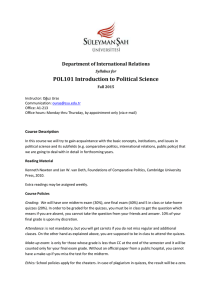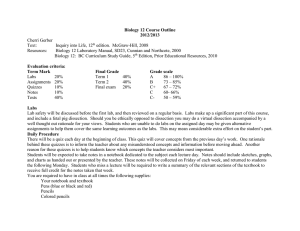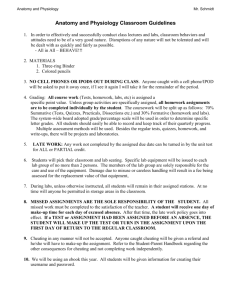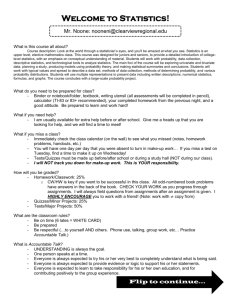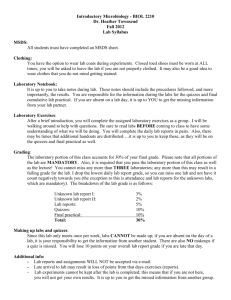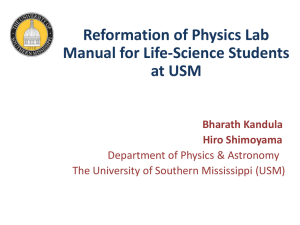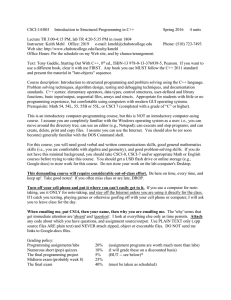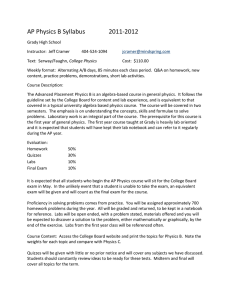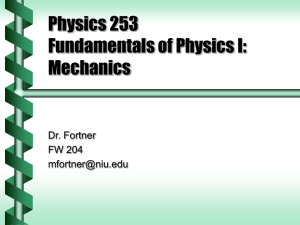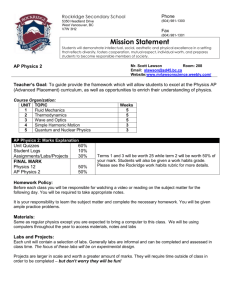physics-a
advertisement
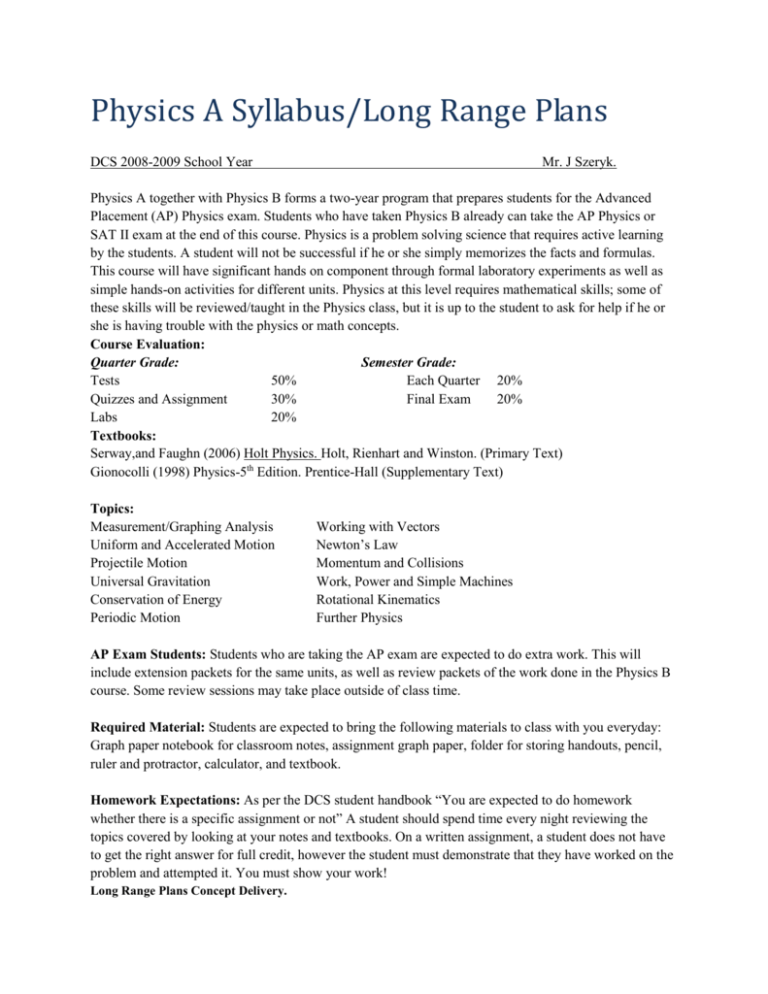
Physics A Syllabus/Long Range Plans DCS 2008-2009 School Year Mr. J Szeryk. Physics A together with Physics B forms a two-year program that prepares students for the Advanced Placement (AP) Physics exam. Students who have taken Physics B already can take the AP Physics or SAT II exam at the end of this course. Physics is a problem solving science that requires active learning by the students. A student will not be successful if he or she simply memorizes the facts and formulas. This course will have significant hands on component through formal laboratory experiments as well as simple hands-on activities for different units. Physics at this level requires mathematical skills; some of these skills will be reviewed/taught in the Physics class, but it is up to the student to ask for help if he or she is having trouble with the physics or math concepts. Course Evaluation: Quarter Grade: Semester Grade: Tests 50% Each Quarter 20% Quizzes and Assignment 30% Final Exam 20% Labs 20% Textbooks: Serway,and Faughn (2006) Holt Physics. Holt, Rienhart and Winston. (Primary Text) Gionocolli (1998) Physics-5th Edition. Prentice-Hall (Supplementary Text) Topics: Measurement/Graphing Analysis Uniform and Accelerated Motion Projectile Motion Universal Gravitation Conservation of Energy Periodic Motion Working with Vectors Newton’s Law Momentum and Collisions Work, Power and Simple Machines Rotational Kinematics Further Physics AP Exam Students: Students who are taking the AP exam are expected to do extra work. This will include extension packets for the same units, as well as review packets of the work done in the Physics B course. Some review sessions may take place outside of class time. Required Material: Students are expected to bring the following materials to class with you everyday: Graph paper notebook for classroom notes, assignment graph paper, folder for storing handouts, pencil, ruler and protractor, calculator, and textbook. Homework Expectations: As per the DCS student handbook “You are expected to do homework whether there is a specific assignment or not” A student should spend time every night reviewing the topics covered by looking at your notes and textbooks. On a written assignment, a student does not have to get the right answer for full credit, however the student must demonstrate that they have worked on the problem and attempted it. You must show your work! Long Range Plans Concept Delivery. Chapter/Topic Chapter Units Examples from Text 1. THE SCIENCE OF PHYSICS (1 weeks) Section 1.1-1.3 Pg 27 #1-45 2. MOTION AND INERTIA (3 weeks) Section 2.1-3-4 Pg 68 #1-51 Pg 108 #1-62 3. FORCES AND INTERACTION (2 weeks) Section 4.1-4.4 Pg 145 #1-54 4. CIRCULAR MOTION AND GRAVITY (2 Weeks) Section 7.1-7.4 Pg 263 #1-55 5. MOMENTUM (2 Weeks) 6. ENERGY (2 Weeks) 7. INTRO TO HEAT (3 Weeks) Section 6.1-6.3 Pg 223 #1-50 Section 5.1-5.4 Pg 184 #1-52 Section 9.1-9.3 (Optional 10.110.3) Pg 322 #1-40 Pg 360 #1-28 8. INTRO TO ELECTRICITY (3 Weeks) 9. CIRCUITS (1 Week) 10. ELECTROMAGNETISM (3 Weeks) 11. WAVES (1 Week) 12. SOUNDWAVES (1 Week) 13. LIGHT (1 Week) 14. WAVE OPTICS (2 Weeks) 15. NUCLEAR PHYSICS (2 Weeks) Section 16.1-16.3 17.1-17.4 Pg 581 #1-56 Pg 626 #1-80 Section 18.1-18.3 Pg 667 #1-49 Section 19.1-19.3 20.1-20.4 Pg 695 #1-46 Pg 739 #1-50 Section 11.1-11.4 Pg 396 #1-51 Section 12.1-12.3 Pg 434 #1-43 Section 13.1-13.4 Pg 476 #1-60 Section 14.1-14.3 15.1-15.3 Pg 514 #1-65 Pg 548 #1-31 Section 22.1-22.4 Pg 820 #1-48 Late and Make-up Policies: Late: Simple Assignments (problems from the book) No credit for late assignment. Labs and Projects: 90% credit if 1 day late; 75% if 2 days late, 50% credit if 3 days late; no credit after 3 days late. Make-up: Lab, quizzes, and tests must be made-up. All of these will be made up outside of regular classroom times-either at lunch or after school. Academic Honesty: Students are expected to complete their own assignments. If two students hand in the same work they will both be given a grade of zero on the assignment. During laboratory experiments students may have the same lab data, but the write-up or the labs needs to be done alone. Calculators will be checked before quizzes. If any illegal programs or data is found in the memory of the calculator the student will take a zero for the test. Any cheating on a quiz, test or an exam will result in a grade of zero on the assignment. Classroom/Lab Behaviour: Students are expected to conduct themselves in an appropriate manner in the classroom. All school rules will be followed in the classroom. During lab activities it is critical that the students listen and follow directions. Dangerous or malicious actions by a student in the lab will not be tolerated due to safety issues. Please contact me with any questions or concerns either by phone at the school or via email at jszeryk@dcssyria.org “I have read and understood the attached syllabus for Physics A 2008/2009. Students Name:___________________________ Student Signature:_________________________ Parent Name:_____________________________ Parent Signature:__________________________ Please return after you have read and signed this sheet to Mr. J Szeryk.
